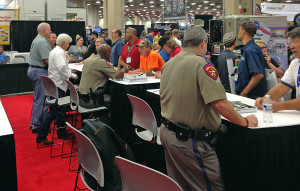Questions about Logbooks, Contaminated Brakes and More Answered by Law Enforcement Officials (as of July 2016)
Warning: Laws are subject to change without notice.
These interpretations were made on June 14, 2016.
Brought to you as a public service by Ol’ Blue, USA and 10-4.
Submit your questions to www.askthelaw.org
WE HOPE TO SEE YOU IN DALLAS
 Please join our Ol’ Blue, USA “Safety Center”® at the Great American Trucking Show (GATS) in Dallas, Texas on August 25, 26 & 27 in booth 23080 and 23084. We are pleased to announce that Lt. Monty Kea and his team from the Texas Highway Patrol will be joining us in Dallas again this year. As you can see in the photo, taken last year at GATS, many drivers took advantage of the opportunity to ask their questions and/or voice their concerns about the laws and regulations they deal with on a daily basis directly to the law enforcement officials in our booth. We are here to help, not harass, so come by and talk to one of our friendly and educated officers. Photo by Monty Dial.
Please join our Ol’ Blue, USA “Safety Center”® at the Great American Trucking Show (GATS) in Dallas, Texas on August 25, 26 & 27 in booth 23080 and 23084. We are pleased to announce that Lt. Monty Kea and his team from the Texas Highway Patrol will be joining us in Dallas again this year. As you can see in the photo, taken last year at GATS, many drivers took advantage of the opportunity to ask their questions and/or voice their concerns about the laws and regulations they deal with on a daily basis directly to the law enforcement officials in our booth. We are here to help, not harass, so come by and talk to one of our friendly and educated officers. Photo by Monty Dial.
IS A LOGBOOK A LEGAL DOCUMENT?
Q: My employer says a logbook is a legal document. They also say that when I am not required to fill one out, they have the option to make me fill one out. If this is true, then they have a choice whether I am subject or not subject to the logbook laws. Is this correct? Thank you in advance – Don in California
A: Provided by Jim Brokaw, formerly a Staff Sergeant, Nebraska State Patrol, Carrier Enforcement Division, Lincoln, NE: It’s safe to say any report, record, document or certificate specified by the Federal Motor Carrier Safety Regulations will be considered a legal document. If you look in 49 CFR 390.35 you will find the regulations prohibit making any fraudulent or intentionally false statements on any documents required by the FMCSRs. To do so carries both civil and criminal penalties. A motor carrier does not have an arbitrary choice with regards to logbooks. 49 CFR Part 395 sets the requirements for the daily log. Per 49 CFR 395.8(f)(7), the driver’s signature certifies all entries made in the daily log are true and correct. And, 49 CFR 395.8(e) will make the driver and motor carrier liable for criminal prosecution for any false reports in connection with the daily log. 49 CFR 390.3 is the general applicability of the safety regulations with 49 CFR 390.3(d) addressing additional requirements. It states nothing in the regulations that shall prohibit an employer from requiring and enforcing more stringent requirements relating to safety of operation and employee safety and health; thus allowing carriers to establish company policies stricter than the safety regulations. In your case, this would be your employer’s requirement, that you need to fill out a log, even when not mandated by federal regulation.
DEFINING CONTAMINATED BRAKES
Q: What is the definition of contaminated brakes? How would one determine if brakes are contaminated? Thanks – Andy in Illinois
A: Provided by Senior Trooper Monty Dial (Ret.), Texas Highway Patrol, Commercial Vehicle Enforcement Division, Garland, TX: When I was working, if the brake drum was not shiny, I considered it contaminated. I found lots of drums and brake shoes that were coated with wheel grease or rust. The seal would become defective and would leak grease onto the drum and brake linings, or the brake linings would not touch the drum, which would cause the drum to rust. I’ve also seen where a driver would have the seal replaced but the mechanic or shop wouldn’t wash the grease off the drum and brake linings. They would merely wipe the grease off and put the drum back on. The grease that was left on the drum or brake lining would cause the drum to have a dull look. This would still be classed as contaminated brakes. Part 393.47(a) is often used to cite a violation for contaminated drums, but it doesn’t give you much information about what is considered contaminated brakes. The North American Out-of-Service Criteria uses several descriptions on what is considered contaminated brakes, but they mainly talk about oil, grease, brake fluid and rust.
~ The Ask The Law™ programs are an ongoing educational effort between Ol’ Blue, USA™ and commercial law enforcement agencies. Ol’ Blue, USA is a non-profit organization dedicated to highway safety education and to improving relations between the motoring public, law enforcement and commercial drivers. “Ask The Law” is a registered trademark of Ol’ Blue, USA. This column is copyrighted© by Ol’ Blue, USA. Warning: Laws are subject to change without notice. These interpretations were made on June 14, 2016.
